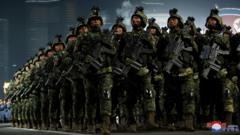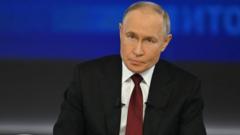Demonstrations in Tbilisi reflect broader regional tensions over European integration, Russian influence, and governmental authority in former Soviet states.
Echoes of Ukraine: Tensions Rise in Georgia Amid Anti-Government Protests

Echoes of Ukraine: Tensions Rise in Georgia Amid Anti-Government Protests
Georgia's protests highlight concerns over its geopolitical alignment, mirroring Ukraine's earlier struggles.
In recent days, the streets of Tbilisi, Georgia's capital, have become the focal point of large-scale protests that echo the political turmoil seen in Ukraine a decade ago. Amidst a growing authoritarian tendency in the government, demonstrators have taken to the streets to express their discontent with the government's cooling relationship with the European Union and warming ties with Moscow.
Protesters, predominantly youth, have voiced demands for governmental accountability and the fostering of better European ties, mirroring similar grievances expressed in Ukraine prior to its escalation into war. Riot police have responded with force, as tensions rise, drawing distinct parallels to the situation in Ukraine where protests similarly escalated due to discontent with governance and foreign relations.
Georgia stands at a precarious geopolitical crossroads, facing the challenge of navigating its desire for European integration against the backdrop of Russia's historical influence in the region. This struggle for identity and allegiance is simultaneously mirrored in Moldova and Ukraine, where Russian military presence remains a contentious issue.
As the situation continues to develop, the echoes of Ukraine's past revolutions linger in the air, presenting critical questions regarding the future trajectory of Georgia’s political landscape and its relationship with both the EU and Russia.
Protesters, predominantly youth, have voiced demands for governmental accountability and the fostering of better European ties, mirroring similar grievances expressed in Ukraine prior to its escalation into war. Riot police have responded with force, as tensions rise, drawing distinct parallels to the situation in Ukraine where protests similarly escalated due to discontent with governance and foreign relations.
Georgia stands at a precarious geopolitical crossroads, facing the challenge of navigating its desire for European integration against the backdrop of Russia's historical influence in the region. This struggle for identity and allegiance is simultaneously mirrored in Moldova and Ukraine, where Russian military presence remains a contentious issue.
As the situation continues to develop, the echoes of Ukraine's past revolutions linger in the air, presenting critical questions regarding the future trajectory of Georgia’s political landscape and its relationship with both the EU and Russia.






















